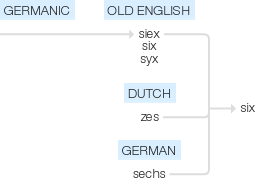Six
Old English siex, six, syx, of Germanic origin; related to Dutch zes and German sechs, from an Indo-European root shared by Latin sex and Greek hex .
wiktionary
From Middle English six, from Old English syx, siex, from Proto-West Germanic *sehs, from Proto-Germanic *sehs, from Proto-Indo-European *swéḱs. Compare West Frisian seis, Dutch zes, Low German söss, sess, German sechs, Norwegian and Danish seks, also Latin sex, Ancient Greek ἕξ(héx), Sanskrit षष्(ṣaṣ). Doublet of sice.
etymonline
six (adj., n.)
"1 more than five, twice three; the number which is one more than five; a symbol representing this number;" Old English siex, six, sex, from Proto-Germanic *seks (source also of Old Saxon and Danish seks, Old Norse, Swedish, and Old Frisian sex, Middle Dutch sesse, Dutch zes, Old High German sehs, German sechs, Gothic saihs), from PIE *s(w)eks (source also of Sanskrit sas, Avestan kshvash, Persian shash, Greek hex, Latin sex, Old Church Slavonic sesti, Polish sześć, Russian shesti, Lithuanian šeši, Old Irish se, Welsh chwech).
Six-shooter, usually a revolver with six chambers, is first attested 1844; six-pack of beverage containers is from 1952, of abdominal muscles by 1995. Six of one and half-a-dozen of the other "little difference" is recorded from 1833. Six-figure in reference to hundreds of thousands (of dollars, etc.) is from 1840. Six feet under "dead" is from 1942.
Phrase at sixes and sevens originally was "hazarding all one's chances," first in Chaucer, perhaps from dicing (the original form was on six and seven); it could be a corruption of at cinque and sice "exposed to great risk" (1530s), literally "at five and six," using the French names (which were common in Middle English) for the highest numbers on the dice. Meaning "at odds, in disagreement or confusion" is from 1785, perhaps via a notion of "left unsettled."
